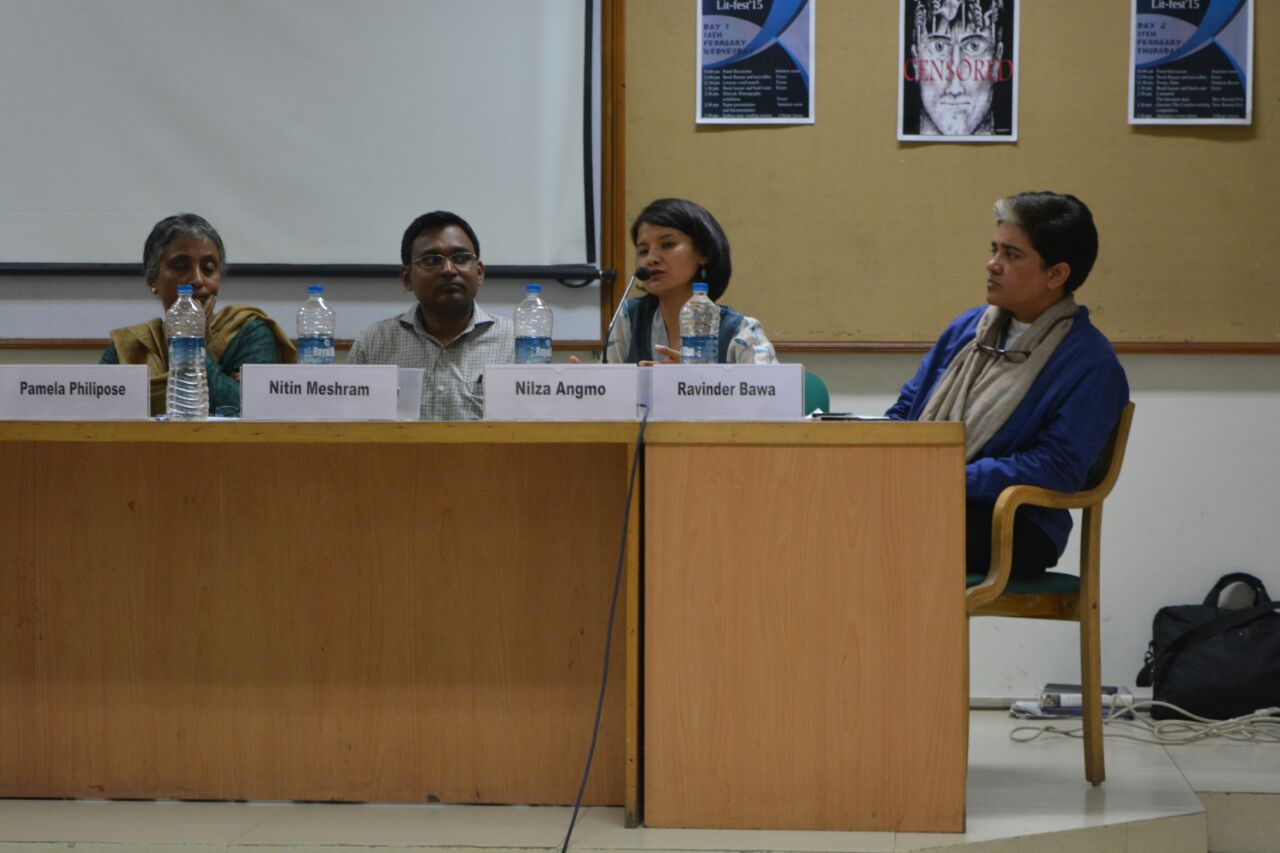
19th February, 2015, the second day of “Censored”- Miranda House Literary Society Festival, saw unprecedented zest, excitement and anticipation. The previous day having been intellectually and artistically stimulating and exhilarating with it’s fun filled events, set high expectations for the following day. The groundwork for this day was laid by a panel discussion on, what was to be, sexuality but, in a surprising turn of events ended up a discussion on censorship. The discussion allowed for an acute, insider look into censorship’s implication on media, as the panel chiefly comprised of journalists. The panellists were Paranjoy Guha Thakurta, Pamela Philipose, Ravinder Bawa, Nilza Angmo and Nitin Meshram. Paranjoy Guha Thakurta is a veteran journalist, political commentator, author and documentary film-maker, Pamela Philipose is presently the director and editor-in-chief of Women’s Feature Service(WFS), Ravinder Bawa, a Miranda House alumna, is presently an independent journalist, Nitin Meshram, a Supreme Court Advocate and Nilza Angmo is working as a professor with the English Dept., Miranda House.
Mr. Thakurta began the session and laid down the framework by introducing the students to censorship as an old, complex issue which has evolved over time. He put forth the case of the film ‘Bandit Queen’ of 1996, which was a landmark in the history of censorship, in the ways that it allowed the filmmaker to use his creative license to express a story. But, instead of keeping in line with those developments, modern cinema and art appear to have underwent the brutal knife of censorship, a little too often (a la Salman Rushdie’s Satanic Verses, Taslima Nasrin’s Lajja, A.K. Ramanujan’s 300 Ramayanas, James Laine’s Shivaji, Perumal Murugan’s Madhorubhagan, etc.). The question which then arose is, “how did we get here?”, the answer to which, was discovered to be, a little help from reasonable restrictions.
This is what Pamela Philipose then expanded upon. Yet, more often than not these restrictions dissipate in times of need, for example, when it comes to censuring politicos spewing hate-speeches to rouse people into heinous acts of violence. Reasonable restriction, in that sense, seems subjective in relation to change in power. It is a product of one’s ideology, location and their understanding of potential threats. This further raises the problematic question of who gets the power to decide what is to be restricted. The general opinion was that the ‘silent majorities’ need to start speaking up for their rights whenever the ambiguities allowed for, by the constitution, are exploited. 21st century is time enough for people to stop compartmentalizing things into absolute and rigid binaries of good versus bad, censorship versus absolute freedom, and neglecting the need for differentiating between hate speech, that may possibly offend the sentiments of a select few, and speeches targeting an entire section of society.
The idea of absolute freedom was taken up by Nitin Meshram. He reminded the audience that the law does not allow for an unbridled right to express. ‘Restrain for peace’ should be the agenda of a democratic society. Media, the fourth pillar of democracy and the mouthpiece of society, has huge accountability to the public, for the information it passes. It has the power to cultivate opinions, ideologies and make them appear naturalised, thus, creating a need for a Media law that metes out appropriate justice to those engaging in gross misrepresentation of facts and ideas. In recent times the pitfalls in the media’s responsibility to inform the public have become visible, revealing that they cultivate opinions of a certain ideological bent and if the news is not appealing enough for popular taste it will inevitably get side-lined
Ravinder Bawa, gave numerous insights into this. She shared incidents when many crucial stories never saw daylight owing to, the different ways in which the current information and media system, bind media personnel with shackles. The ever increasing consumerism in the world reduces hard facts and news to revenue and TRPs. The pressure from media house owners and ‘contractual labour’ statuses, adds to the load under which work ethic crumbles leading to important but uninteresting stories like a flood situation being tossed aside for celebrity gossip.
After the insight provided by Ravinder Bawa, Nilza Angmo took over. She put things into perspective as a student of Comparative Literature and explained how, the tendency for alternative readings of popular stories to be censured and taken apart, leaves the society at the mercy of an ideology that fits in the constructed Indian identity and how unearthing any story slightly deviated from the popularised versions, sometimes, becomes a humongous task, in itself. Many cultures, which do not follow a written tradition and lean on a picture/ story telling tradition, tend to get marginalised. There is, therefore, a need to assimilate the different and marginalised traditions and stories, as they allow for things to be seen in their multiplicity of perspectives and possibilities.
Media, therefore, needs to be a repository of opinions and promoter of opinion building. Its shrunken role over the past decades needs to be reversed. The need being, to present people with all possible sides of an issue and leaving it for them to decide. Until media is not set free from its contractual nature, it is upon the viewers to look through more sources and channels and not to rely on only one or a handful of them. Looking at online media also presents a good alternative model as there is no dependency on media houses. Above all freedom of speech and expression requires to be opened up, as, the very ideas of what is ‘decent’ or ‘obscene’ are not static. We live in a democratic society yet, a limited section of society takes the law into its hands and decides for the rest. People’s thoughts and ideas need to be allowed free flow and exchange. We need to protest and persist because as Mr. Thakurta concluded “We don’t protest loud enough”.
Leave a Reply